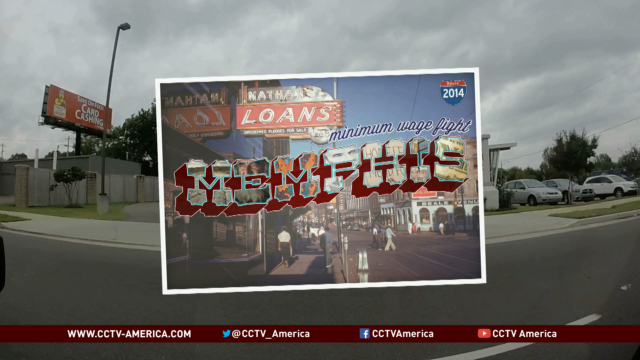There are millions of Americans trying to make a living off the federal minimum wage of $7.25 an hour. In fact, many people are holding down two or even three jobs to make ends meet. There’s a growing fight in the U.S. led by President Barack Obama to raise the minimum wage. A handful of states have the issue on the ballot this year, and in others such as Tennessee, there’s a grassroots effort to give people an hourly boost.
In our continuing Route 2014 series, CCTV America’s Sean Callebs traveled to Memphis, Tennessee where impoverished workers are pushing for a better quality of life.
No state in the nation has more people working below the federal minimum wage than Tennessee. There is a vocal group in the city of Memphis, trying to change that as November’s midterm elections approach.

Twenty-three-year-old Larika Harris works the overnight shift at a McDonald’s.
“I don’t want to be on food stamps and Medicaid all my life. I don’t want to be that statistic, an African-American who only depends on the government. But when I only make $7.25 an hour, and one check barely covers the rent, where is the light bill coming from?” Harris said.
Indeed, where will money for the electric bill come from, or food and clothes for her two children? Harris called her living condition “terrible.” A rundown apartment in the projects, crime, and other woes are right outside her door. Harris is among those fighting for a minimum wage of $15 an hour.
A new CCTV America poll released Friday shows that Americans believe the federal minimum wage in the United States should be set at just below $10 per hour, an increase of 35 percent over the current level.
There are some 900 fast food restaurants paying meager wages to some 20,000 people in Memphis. Tennessee is one of only five states without a minimum wage, but more than seven percent of its citizens make at or below the federal minimum requirement of $7.25 an hour.
Sheena Foster at Workers Interfaith Network is committed to creating a minimum wage in Tennessee of $15 an hour. Earlier in the year, there were several protests, but when state lawmakers had a chance to vote to for a minimum wage $1 above the national mandate, it was rejected as an unfair burden to small businesses.
“I have heard that it is ludicrous, I have always been told that if you want something you have to ask for it. If you don’t get it, you have to demand it,” Foster said.
President Obama said he wants the national minimum wage to be $10.10 within two years, but Republicans are fighting him. Five states will vote whether to raise the minimum wage on Tuesday. With the gap widening between the haves and the have nots, Foster expected voters would be heard.
Half of Americans want the minimum wage somewhere between $9 and $15 per hour. Another one in five wants it even higher than that. CCTV America interviewed Dr. Randy Albelda, an economics professor at University of Massachusetts Boston, on whether the U.S. Congress is likely to make that happen.

For more insight on the U.S. minimum wage, CCTV America interviewed Fadhel Kaboub, Associate Professor at Denison University.

For more behind-the-scenes information about this series visit:
 CGTN America
CGTN America


